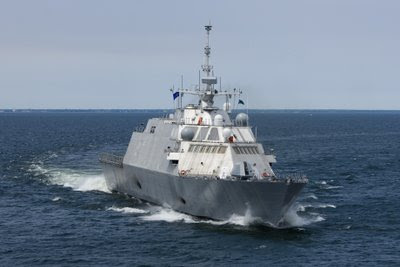 In this article with excerpts from a December meeting of Naval Engineers, Rear Admiral Thomas Eccles, Naval Sea Systems Command's Deputy CC for Ship Design, Integration and Engineering, perfectly describes the need to use the Fully Burdened Cost of Fuel (FBCF) and an Energy Efficiency Key Performance Parameter (KPP) without actually using either term.
In this article with excerpts from a December meeting of Naval Engineers, Rear Admiral Thomas Eccles, Naval Sea Systems Command's Deputy CC for Ship Design, Integration and Engineering, perfectly describes the need to use the Fully Burdened Cost of Fuel (FBCF) and an Energy Efficiency Key Performance Parameter (KPP) without actually using either term.Isn't this a great description for platform design processes pre Energy Efficiency KPP:
Eccles cited the Navy's new Littoral Combat Ship (LCS) as a hypothetical example of how fuel economy could be weighed against capability in the development process. The fleet of 55 LCSs the Navy plans "will drink a lot more fuel per ton" than other surface ships, Eccles said. "If you want something that's going to do 45 or more knots ... that comes at some fuel costs .... I ask myself, for the combat capability, is that a price we ought to be paying?"
Add to that this direct (yet indirect) way of defining the FBCF:
[Eccles said] that the cost of that fuel consumption should not just be considered as just the fuel itself, but also the cost of getting [it] to the fleet.Too bad that the LCS' high level of fuel consumption is already baked in. But very glad to hear these sentiments described so bluntly. Now all the Navy has to do is take the last few steps, as required by CJCSI 3170.01 and DoDI 5000.02, and strongly recommended by two DSB Energy Task Forces, is to use the right words. Someday, with luck, we'll all be speaking the same language and making major energy security strides in the US Navy and across the DOD.
Photo: USN

No comments:
Post a Comment